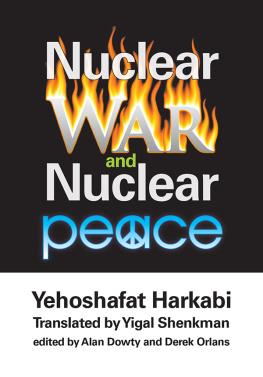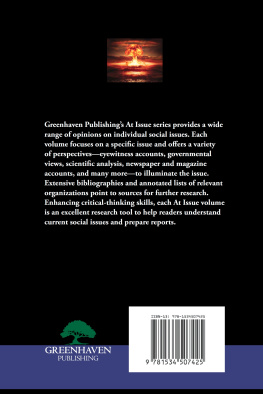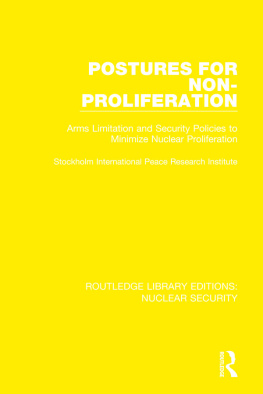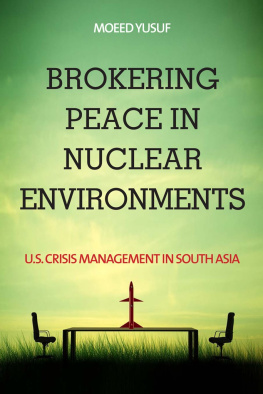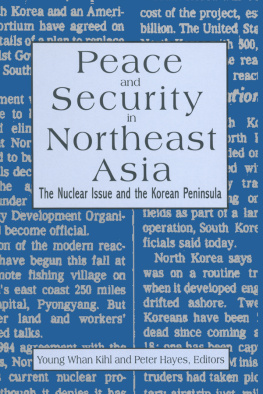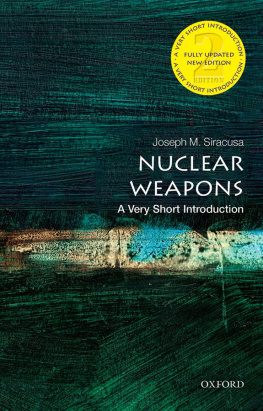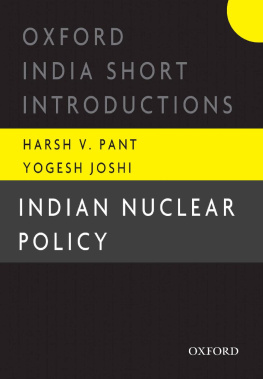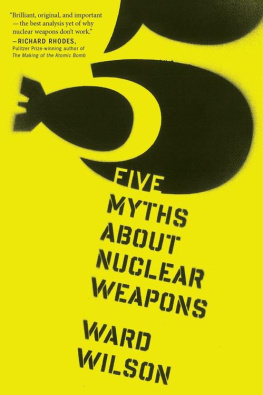Nuclear War and Nuclear peace
Nuclear War and Nuclear peace
Yehoshafat Harkabi
Translated by Yigal Shenkman
edited by Alan Dowty and Derek Orlans
First published 1966 by Transaction Publishers
Published 2017 by Routledge
2 Park Square, Milton Park, Abingdon, Oxon OX14 4RN
711 Third Avenue, New York, NY 10017, USA
Routledge is an imprint of the Taylor & Francis Group, an informa business
Copyright 1966 by Israel Program for Scientific Translations.
All rights reserved. No part of this book may be reprinted or reproduced or utilised in any form or by any electronic, mechanical, or other means, now known or hereafter invented, including photocopying and recording, or in any information storage or retrieval system, without permission in writing from the publishers.
Notice:
Product or corporate names may be trademarks or registered trademarks, and are used only for identification and explanation without intent to infringe.
Library of Congress Catalog Number: 2007049562
Library of Congress Cataloging-in-Publication Data
Harkabi, Yehoshafat, 1921-1994.
[Milhamah gar'init ve-shalom gar'ini English]
Nuclear war and nuclear peace / Yehoshafat Harkabi ; translated by Yigal Shenkman ; translated by Yigal Shenkman ; edited by Alan Dowty and Derek Orlans.
p. cm.
Includes bibliographical references and index.
ISBN 978-1-4128-0758-6
1. Nuclear warfare. I. Title.
UF767.H2613 2008
355.02'17dc22
2007049562
ISBN 13: 978-1-4128-0758-6 (pbk)
Publishers Note
The publisher has gone to great lengths to ensure the quality of this book but points out that some imperfections from the original may be apparent.
WHEN this book was written, in 1963, the author felt that possibilities of further innovations in nuclear strategy were tapering off, and that there was a need to summarize and systematize the subject. His main concern was to present to the Israeli public a picture of the grave issues which have been thrust upon humanity by nuclear weapons. The author describes his book as eclectic, in that he has drawn extensively on the existing literature on modern strategy in English and French, to which he is indebted. His approach was to avoid limiting himself to discussion of the technicalities of strategy, and he has tried to cover wider aspects of the impact of nuclear weapons on the climate of our age. The book was well received by the Israeli public and a second reprint was run off within a few months. Its particular merit is that it can serve both as an introduction for the layman and as a textbook for students. It is used in the political science faculties in universities in Israel.
Translating the book into English took much longer than envisaged. We have tried to preserve the original flavor, and quotations from the Jewish sages and traditional lore have been retained. Minor modifications and additions have been made in the English translation to bring the book more up to date.
Table of Contents
CHAPTER ONE
NUCLEAR STRATEGY
CHAPTER TWO
DETERRENCE
CHAPTER THREE
STRATEGIC CONCEPTS: SURPRISE, PREEMPTION AND STABILITY
CHAPTER FOUR
STRATEGIC DOCTRINES: THE SIZE OF FORCES REQUIRED
CHAPTER FIVE
STRATEGIC DOCTRINES: COMPOSITION OF FORCES
CHAPTER SIX
LIMITED WARCONVENTIONAL AND NUCLEAR
CHAPTER SEVEN
LIMITED STRATEGIC WARCONTROLLED NUCLEAR REPRISAL
CHAPTER EIGHT
THE UNIVERSE OF VIOLENCE
CHAPTER NINE
COMMUNICATION OF THE THREAT
CHAPTER TEN
ALLIANCE IN THE NUCLEAR ERA-NATO
CHAPTER ELEVEN
PROLIFERATION AND THE OUTBREAK OF WAR
CHAPTER TWELVE
DISARMAMENT AND ARMS CONTROL
CHAPTER THIRTEEN
COMPLEXITIES OF A NUCLEAR WORLD
THIS book began as a personal effort to comprehend the effect of nuclear weapons on the character of our era and its international system. These weapons have not merely caused a revolution in the military sphere, but are also leaving their stamp on the world order. They may determine the fate of mankind. Knowledge of the basic principles of nuclear strategy has become a prerequisite to understanding the course of world events. Consequently, there is no country that can remain indifferent to nuclear strategy or that can consider itself exempt from its implications. This applies to large and small states alike, whether they possess nuclear weapons or not. The public debate on nuclear strategy that has been initiated in a number of the larger countries will of necessity ultimately spread to the entire world.
The very importance of the subject precludes the assumption of a narrow technical or military approach. An extensive complex of problems must be encompassed, and their political, historical, moral and even religious implications examined.
The study of nuclear strategy reflects a striving to master the conditions created by the development of the nuclear weapons, to adjust to their existence, and even to learn to utilize it. This task involves an incessant struggle originating, on the one hand, in fear and awareness of the fateful nature of the subject, and on the other hand, in a feeling of inadequacy in the face of the vast problems posed by nuclear weapons. Efforts to resolve these questions have been marked by frustration and contradictions, for mankind has never before been confronted with similar complexities. Never have countries disposed of such great power, and yet at the same time felt so insecure. Never has power left its possessors so frustrated.
Nuclear strategy is a vast subject which is not easily exhausted. Furthermore, much relevant material is still classified as secret by the nuclear powers, though sufficient has been published to give a meaningful picture. It cannot be assumed that the development of nuclear strategy has already finally crystallized, though it seems that in the present state of the art the possibilities of doctrinal strategic innovations have tapered off. However, technological breakthoughts may bring about far-reaching changes.
Many books and articles have been published on nuclear strategy. Most of these studies, however, have been generally designed to formulate strategic policies to suit the needs of particular countries and influence their policy. Most of the books on nuclear strategy have appeared in the United States, almost all of them being strategic prescriptions for the United States. The lose connection between strategy and policy leads to discussion of concrete issues, strongly influenced by political circumstances.
The purpose of this essay is different. The intention here is to abstract and generalize, to break nuclear strategy down into fundamental components and to examine them without reference to any given political circumstances. It is impossible, of course, to discuss the subject without referring to the concrete cases from which nuclear strategy has evolved, and these have therefore served as a basis and a point of departure. There is in this book no pretense of innovation in strategy, but rather an endeavor to identify the operative factors of nuclear strategy and to arrange them systematically so as to facilitate clarification of the problems involved. There has been no intention to propose solutions or to defend particular views, but rather an attempt to highlight certain problems and to arouse interest in these issues of fateful portent.


